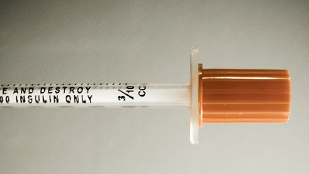 FLICKR, JILL A. BROWN
FLICKR, JILL A. BROWN
A call to ban the diabetes drug Victoza has highlighted the potential dangers of a certain class of diabetes medication, reported Nature. Earlier this month (April 19), based on data from its adverse-event database, consumer advocacy group Public Citizen asked the US Food and Drug Administration to ban Victoza. The data, it says, suggest that drugs designed to mimic glucagons-like peptide 1 (GLP-1) may increase pancreatic and thyroid cancer risk—a finding corroborated by studies in rodents.
GLP-1 mimics stimulate the pancreas to produce more insulin, resulting in lowered blood sugar. In some patients, the drugs cause inflammation in the pancreas, which may promote cancer development. Indeed, research in rats and mice by Peter Butler, an endocrinologist at the University of California, Los Angeles, suggests that ...



















